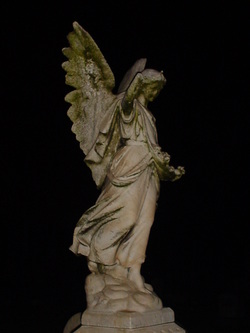Spirits in the Scriptures

Laurel Hill Cemetery, Philadelphia, PA
Many people don't believe in ghosts or the spirit world because they think there is no proof in the Bible that they exist. Many people believe it is against God or spirits are tied in with the devil. Well, after reading The Complete Book of Ghosts by Paul Roland I finally have proof ghosts, spirits, and apparitions in the Bible. Thank you, Paul Roland, for helping me get the message across, they do exist, just read the Bible.
Taken From Paul Roland's The Complete Book Of Ghosts
'So Saul disguised himself, putting on other clothes, and at night he and two men went to the woman. "Consult a spirit for me," he said, "and bring up for me the one I name"
1 Samuel 28:8
Communication with spirits was forbidden by the Old Testament (Deuteronomy 18:9-14), but conscious awareness of the higher worlds for the purpose of self-realization or enlightenment had been practiced since biblical time by initiates of Merkabah, a forerunner of the modern Jewish mystical teaching known as Kabbalah.
Spirits are not acknowledged explicitly in the New Testament although their existence is clearly implied, most notably in Luke 24:39, when Jesus tells his followers: 'Touch me and make sure that I am not a ghost, because ghosts don't have bodies, as you see that I do!'
In 1 Corinthians 15:50 and 2 Peter 1:18 it is stated that flesh and blood cannot enter the celestial kingdom; in John 3:13 it is noted that heaven is for spiritual beings and that we are all spirit in essence and will return from whence we came: 'And no man hath ascended up to heaven, but he that came down from the heaven, even the Son of man which is in heaven.'
St. Paul attempted to clarify the idea that Jesus had risen physically from the tomb and in so doing made a distinction between our earthly form and our spirit: 'There are also celestial bodies, and bodies terrestrial is another...There is a natural body and there is a spiritual body. (1 Corinthians 15:35-44).
Elsewhere, in 2 Corinthians, St. Paul speaks of having attained separation of the spirit and the body at will and having ascended 'in the spirit' to the third heaven, which was a technique he may have mastered as an initiate of an aesthetis sect of Jewish mystics who practiced merkabah- an advanced form of mediation which translates as 'rising in the chariot'.
Taken From Paul Roland's The Complete Book Of Ghosts
'So Saul disguised himself, putting on other clothes, and at night he and two men went to the woman. "Consult a spirit for me," he said, "and bring up for me the one I name"
1 Samuel 28:8
Communication with spirits was forbidden by the Old Testament (Deuteronomy 18:9-14), but conscious awareness of the higher worlds for the purpose of self-realization or enlightenment had been practiced since biblical time by initiates of Merkabah, a forerunner of the modern Jewish mystical teaching known as Kabbalah.
Spirits are not acknowledged explicitly in the New Testament although their existence is clearly implied, most notably in Luke 24:39, when Jesus tells his followers: 'Touch me and make sure that I am not a ghost, because ghosts don't have bodies, as you see that I do!'
In 1 Corinthians 15:50 and 2 Peter 1:18 it is stated that flesh and blood cannot enter the celestial kingdom; in John 3:13 it is noted that heaven is for spiritual beings and that we are all spirit in essence and will return from whence we came: 'And no man hath ascended up to heaven, but he that came down from the heaven, even the Son of man which is in heaven.'
St. Paul attempted to clarify the idea that Jesus had risen physically from the tomb and in so doing made a distinction between our earthly form and our spirit: 'There are also celestial bodies, and bodies terrestrial is another...There is a natural body and there is a spiritual body. (1 Corinthians 15:35-44).
Elsewhere, in 2 Corinthians, St. Paul speaks of having attained separation of the spirit and the body at will and having ascended 'in the spirit' to the third heaven, which was a technique he may have mastered as an initiate of an aesthetis sect of Jewish mystics who practiced merkabah- an advanced form of mediation which translates as 'rising in the chariot'.
